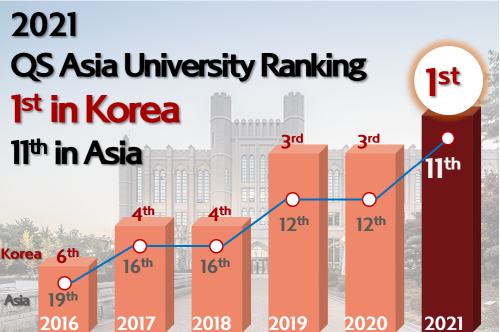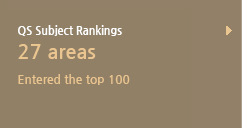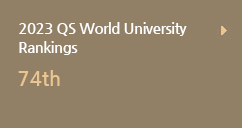KU ranked first among Korean universities
in 2021 QS Asia University Rankings
First in category of international research network for three consecutive years
Ranking boosted by improvement
in categories of employer reputation and research reputation

▲ Korea University’s consistent improvement in the rankings since 2015
Korea University ranked 1st among Korean universities for the first time in a ranking of universities in Asia.
In the 2021 Asia University Rankings of Quacquarelli Symonds (QS), a British company that analyzes universities around the world, Korea University (President Chung Jin Taek) was ranked 11th overall and 1st among Korean universities.
The QS Asia University Rankings was launched in 2009, and this is the first time that Korea University topped the list among Korean universities. In last year’s rankings, the university took first place among private universities in Korea for the fourth time in a row, but trailed behind KAIST and Seoul National University in the overall rankings.
While most Korean universities fared more poorly this year than last, Korea University climbed from 12th to 11th place in Asia. It has ranked first among Korean universities for three consecutive years in international research network, and clinched the top spot this year thanks to its consistent performance in employer reputation and research reputation.
The QS Asia University Rankings has ranked universities in Asia since 2009 based on 11 indicators, among which the category of international research network was introduced as an indicator in 2018.
The weighting of the 11 indicators used in the QS Asia University Rankings is as follows: academic reputation amounts to 30% of the total score, employer reputation is at 20%, faculty/student ratio is at 10%, international research network is at 10%, citations per paper is at 10%, papers per faculty member is at 5%, proportion of staff with a PhD is at 5%, proportion of international faculty is at 2.5%, proportion of international students is at 2.5%, proportion of inbound exchange students is at 2.5%, and proportion of outbound exchange students is at 2.5%. This leads to a more detailed evaluation than that of the QS World University Rankings, which relies on six indicators.
■ Outstanding indicator: Employer reputation
“Taking the lead in fostering creative future-oriented talent”
Like last year, Korea University was ranked 12th in the category of employer reputation. The university has maintained an excellent reputation in other rankings at home and abroad, and is known to produce talent that meets the demands of society.
The university is fostering talent with a holistic sense of ethics that extends beyond narrow forms of knowledge or univocal beliefs by incorporating activities outside the curriculum into the student experience. The Korea University Social Service Organization, which is celebrating its tenth anniversary this year, has established more than 600 programs to further this goal, and is participating in efforts to save the Aral Sea and in other volunteer programs. Even during the COVID-19 crisis, Korea University is offering learning opportunities to the socially marginalized through the 1-to-1 mentoring program School of Sharing the Future, the distance learning program Microphone Check, and the youth mentoring program Perfect Partner. In addition to socially-conscious volunteering, students can develop a sense of greater responsibility and improve their leadership, communication, and collaborative skills through exchange student programs with over 1,000 partner institutions, overseas internships at international organizations, startup support facilities, and involvement in more than 100 student clubs.
This June, Korea University introduced KUchive, an AI-based and automated integrated curricular and extracurricular management system which provides user-centered educational infrastructure support. It helps students to participate in curricular and extracurricular programs that strengthen six core competencies, namely empathy and communication, the sense of social responsibility, multidisciplinary thinking, creative problem-solving, the development of a global mindset, and proactive leadership. Students can also receive guidance on career planning, the identification of their strengths and the ways to overcome their weaknesses.
Korea University provides career development services which enable students to maximize the value of their experiences and competencies, allowing them to successfully work in their chosen fields. The Job Academy, which enhances their understanding of job responsibilities and real-world tasks, has been especially popular, and one-to-one counseling is also available to those seeking personalized advice in their areas of specialization. The vast range of over 30 programs includes the Interview Clinic, which simulates job interviews with employers, and the SOP Proofreading Clinic.
Korea University’s outstanding ranking in the category of employer reputation can be attributed to its fostering of creative talent through various extracurricular activities, and its career development services that prepare students for the real world.
■ Outstanding indicator: Researcher reputation and international research network
“Researcher-centered research for commercialization and social contributions”
Korea University climbed one place in the category of researcher reputation, and maintained the same ranking in that of international research network. For both indicators, it was ranked 17th.
The university runs various programs that aim to create a robust research environment that promotes research-centered work which has the potential for commercialization and for making a social contribution.
A systematic rewards system is in place which emphasizes the qualitative aspects of academic papers, namely their impact, number of citations, and influence in relevant disciplines. Researchers are encouraged to publish internationally by making use of the proofreading support program, and to participate in multidisciplinary research projects under the multidisciplinary research support program.
The university's Future Research Grant (KU-FRG) incentivizes researchers to conduct creative research on challenging issues. Other grants are available for international research cooperation, new faculty settlement, large-scale research projects, multidisciplinary research, and research in both basic and niche disciplines.
Faculty members who have demonstrated research excellence are recognized by the Seoktap Research Award and the Seoktap Technology Award. Introduced last year, the Inseong Star Researcher Award offers generous research grants which motivate faculty in conducting long-term research worthy of winning the Nobel Prize.
The Research Information Analysis Center collects and compiles academic data (from Scopus, Web of Science, Korea Citation Index, etc.), and publishes reports on research achievements by discipline. The analytical data on Highly Cited Researchers (HCRs: Researchers ranked in the world’s top 1%) and on potential HCRs assists departments and administrative offices in securing outstanding researchers and in making strategic decisions concerning research promotional policies.
Korea University analyzes not only the latest research trends, including the direction of its Sustainable Development Goals (KU-SDGs), but also the research competencies of institutes and researchers in order to ensure effective research cooperation and researcher matching. Various indicators are utilized to enhance international research cooperation, so as to accelerate the internationalization of the university and its researchers.
Research achievements are promoted through various channels such as Pure, KU Research, and Research Profile, thereby enhancing the visibility and accessibility of KU's research, and drawing the interest of researchers working in related fields.
The university plans to further strengthen its research-centered support system. The Graduate School of AI will establish strong ties with outstanding universities and research institutes in order to attract investors, and opportunities for mutual growth in emerging fields will be explored, with the aim of contributing to the UN Sustainable Development Goals (UN-SDGs). These efforts will strengthen the university’s research capabilities while emphasizing the value of commercialization, which is essential in addressing the various issues faced by the international community.
Jang Gil-soo, Korea University’s Vice President for Planning and Budget, said, “Our improved standing reflects our efforts to foster creative future-oriented talent and to become a world-class research university. We will continue to enhance our research and educational capacities with the aim of ensuring sustainable development.”



